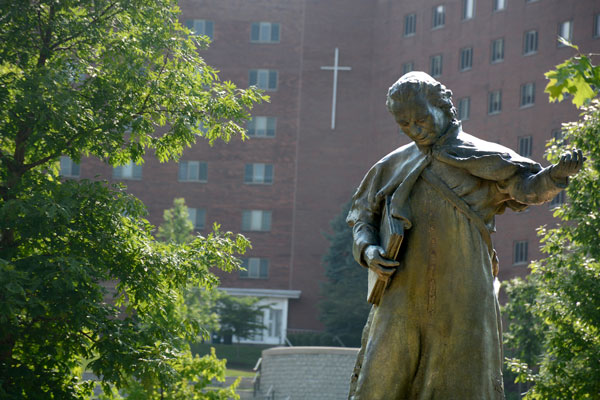News

University of Dayton resumes long-range financial planning effort
The University of Dayton today announced its long-range financial planning process, started in 2019 but interrupted by the pandemic, is resuming to consider a wide range of academic and operational changes to help the institution continue to thrive in the face of longer-term trends affecting higher education.
"The University is strong financially, and we are undertaking this process as a way to protect the financial health and quality of a UD education," President Eric F. Spina said in a message to campus. "As a well-managed organization, this proactive approach will allow us to manage change and control our own destiny while ensuring we preserve our high-quality, Marianist educational mission."
Prior to and throughout the pandemic, the University achieved positive financial results by curbing cost growth along the margins and utilizing other short-term tactics. However, the University must do more than incremental change to ensure its long-term health and enable continued focus on its identity, core mission, and values.
The initiative will address long-term challenges affecting higher education including major demographic changes, as well as the five-year financial impact of the pandemic, primarily from increased financial aid commitments to new and continuing students as well as the pandemic's impact on international enrollment.
"The University is clear-eyed about the challenges we face. We will follow the lead of our Marianist founders and take bold, decisive action to maintain a high-quality University of Dayton education for current and future students, and continue to live our mission in service to others, while remaining financially strong," Spina said. "The path we chart will enable the University to wisely adjust to these circumstances and control our own destiny in a rapidly changing world."
Spina emphasized that the University of Dayton consistently achieves strong, record-breaking enrollments, operates with positive financial margins and a strong balance sheet, and continues to enjoy strong and growing financial support from alumni and donors who fuel student success and innovative University initiatives. Current students and families will see very little, if any, impact.
"The pandemic and demographic shifts demonstrate that universities must continue to adapt. Our proactive approach will allow us to manage strategically through the challenges ahead and shape the University's future for generations of Flyers to come," Spina said.
A group of faculty, staff, and trustees will be charged with developing recommendations on operational, organizational, financial, and programmatic changes for the 2023 fiscal year budget and beyond.
